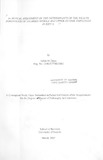| dc.description.abstract | The accumulation of personal wealth during a person's working life plays a key role in
promoting savings, facilitating wealth creation and cushioning people in old age.
Understanding the determinants of the accumulation of personal wealth whereby savings
exceed consumption over a specified time is critical in informing the structure of personal
wealth portfolios. The subject has, as a result. attracted the interest of academicians.
practitioners and policy makers in many countries.
This study examines literature on the accumulation of personal wealth. This is done with a
view to developing a conceptualmodel for use in assessing the determinants of the nature,
mix and size of wealth holding of salaried-middle and upper income employees in Kenya.
where such a study has not been undertaken before. Theoretical and empirical literature from
studies in other parts of the world as well as data from wealth reports in Kenya is examined to
inform the conceptual model.
The review identifies Life Cycle Hypothesis and Modern Portfolio Theory as the key models
that encapsulate the principal concepts that explain personal wealth holding and its
determinants. Nonetheless, evidence reviewed shows that the assumptions and conclusions
pertaining to these models may not always hold when empirical data is subjected to rigorous
analysis. With respect to LCH, this is particularly the case considering that employees
nearing retirement are found to have little savings and hold inadequate and heterogeneous
wealth. Also, in the case of MPT, people are found to have simple, narrow and undiversified
wealth portfolios.
We establish that attributes that are personal to the employee as well as external variables
determine the accumulation of personal wealth. Besides age and preferences, the other
personal attributes are found to include income; gender; marital status; bequests; education:
family size and job while in addition to asset returns, other external variables are: taxes:
inflation; culture/tradition; financial markets; prices; costs and advisory services available.
The unfavourable economic environment in Kenya that is characterised by low incomes, high
uncertainties, substantial liquidity constraints, wide interest-spreads and high costs of debt
and transactions suggest that employee wealth is likely to be low and undiversified. | en |

